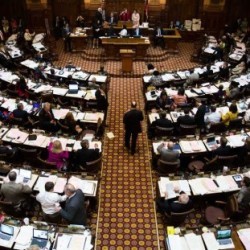Georgia Begins Debating Casino Legislation

History shows that state lawmakers’ opinions on legal gambling often change not due to support or pressure from their constituents but in response to financial concerns. When budget deficits interfere with state business, gambling revenue is often turned to as a way to generate a continuous stream of tax revenue and short-term funds in the form of licensing fees. Such is the case with Georgia, where lawmakers are now seriously considering regulating brick-and-mortar gambling to help fund an important higher education program.
About the HOPE Scholarship
Like many states, Georgia seeks to help residents pay for college by providing financial aid at the state level. The primary way that this is done is through the HOPE Scholarship program that provides funding for eligible students enrolled in qualified post-secondary education programs, such as trade school, community college and traditional four-year universities. The program has been in place since 1993 and was designed to be paid for by proceeds from the state lottery; however, Georgia’s refusal to participate in multi-state games has seriously limited the amount of revenue available to fund the program. Legislators are currently examining whether revenue generated by taxing and licensing land-based casinos would be a viable option for keeping the HOPE Scholarship fully funded.
Varying Opinions from Lawmakers
Legislators are speaking out for and against the idea of legal casino gambling in the state. Bill Cowsert, the Senate Majority Leader, has stated that he doesn’t think it’s necessary to legalize gambling in order to pay for the HOPE Scholarship. He proposes changing the current law to require the lottery to pay a 35 percent tax consistently each year. Currently, the lottery corporation can opt to pay less tax money if payouts or participation in lottery games is outside of the expectations. Cowsert’s proposed changes would eliminate this loophole.
Other lawmakers are saying that they would support legalizing gambling to pay for the HOPE Scholarship, but only if the bill would help to minimize the possible negative social impacts of gambling. One State Senator, Valencia Seay, went on the record saying that she would only vote for a bill that addressed gambling addiction among Georgia residents. Not only does she feel that a portion of tax money generated should go to funding gambling addiction programs as is the norm in other states, but she also believes that money should be reserved to provide financial assistance to families who end up in hardship due to gambling addiction.
Casinos Keeping an Eye on Developments
As soon as news broke that Georgia was considering a move to legalize brick-and-mortar casinos, the top casino companies took notice. MGM Resorts, the owner of Mandalay Bay, MGM Grand and the Bellagio in Las Vegas, is reportedly already developing plans to put a casino valued at least at $1 billion in Atlanta. The Las Vegas Sands Corporation is also rumored to be interested in bringing a casino to the Peach State. Reportedly, the company may abandon the fight to build a casino in Florida and instead open a resort somewhere in Georgia.
2016 Georgia General Assembly Session Begins
On January 11th, the 2016 legislative session of Georgia’s General Assembly got underway, with lawmakers laying out their priorities for the year ahead. High on the list is the state’s $21.8 billion budget for Fiscal Year 2016, which is expected to rise further in 2017. The budget process is expected to take at least 40 legislative days to reach a conclusion, with gambling expansion seen as a means of raising the extra funds needed to meet the budgetary requirements. Speaking about the proposed casino bill that will be put before legislators this year, Ronnie Mabra (D-Fayetteville), explained:
“I believe the goal of bringing regulated resort style casinos to Georgia is something the legislature should take seriously in 2016. A decade ago Georgia took bold steps to attract movie studios to Georgia. Twenty-three years ago we introduced the Georgia Lottery. Both of these measures were hotly debated at the time and the results have been phenomenal. Though I am currently neutral, I think a responsible casino bill should be argued and all of Georgia should have an opportunity to weigh in either directly or through their elected officials. Both sides should be taken seriously.”
Rep. Ron Stephens (R-Savannah) introduced the casino bill at the end of the 2015 legislative session, with its key points including allowing six casinos across Atlanta, Columbus, Macon, Savannah and South Georgia, and imposing a 12% tax rate on these operations, which is expected to generate $239 million for the state, more than enough to fund the HOPE Scholarship.








